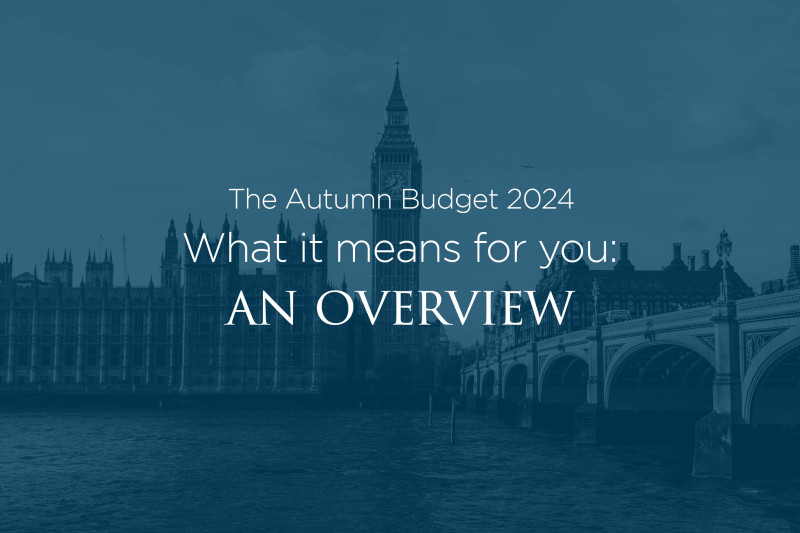The Autumn Budget: A Summary

“Let me tell you how it will be”. One of the opening lines of the Beatles 1966 song Taxman, and something I and many other professional advisers would have loved to have said to our clients over the past few weeks. The Budget was announced weeks ago, and the business community has been frantically preparing, and speculating, about what changes Rachel Reeves would make to the country’s finances.
The Chancellor already announced the removal of the Winter Fuel Allowance from many previously eligible recipients (some may argue in doing so, she decided to effectively “tax the heat”), and uplifted the National Living Wage to £12.21 for over 21’s from April 2025 (up from £11.44). Today however, we got more answers on the Government’s wider plans, with a first Labour Budget in 14 years. It produced over £40bn in tax rises, making my soundtrack aptly chosen, but what else was in the Budget:
Taxation
- Employee Income Tax and National Insurance, and VAT, will not be raised. The freeze on Income Tax and National Insurance thresholds will not be extended beyond 2028/2029.
- Capital Gains Tax bands have increased, with the lower band rate increasing from 10% to 18%, and the upper band rate increasing from 20% to 24%. Both of these changes are effective from today.
- The Government maintained the lifetime allowance for Business Asset Disposal Relief at £1,000,000 – rate increases will be phased in over time, climbing to 14% in April 2025, and 18% in April 2026.
- The main rate of Corporation Tax has been held at 25%, which the Government proudly has stated is the lowest in the G7.
- Employer’s National Insurance Contributions, currently set at 13.8%, will now be paid at 15%. The rate at which Employer’s NI contributions become payable has been significantly reduced to £5,000. However, employers will now be able to claim back up to £10,500 from their National Insurance Bill.
- The government is introducing a package of reforms to the taxation of Employee Ownership Trusts and Employee Benefit Trusts, targeting abuse, and ensuring that the regimes remain focused on encouraging employee ownership and rewarding employees. The changes will take effect from 30 October 2024, but no further details are provided.
- Inheritance tax thresholds have been extended to 2030, with the first £325,000 of an estate being inherited tax free, rising to £500,000 where the estate includes a residence passed to a direct descendant, and £1,000,000 where a tax free allowance is passed to a surviving spouse or partner.
- Agricultural Property Relief will continue in its current form until 6 April 2026. However, the rate will then be 50% thereafter, resulting in a potential major change for many of our local farmers. Business Property Relief will also be reformed in April 2026.
- Stamp Duty Land Tax – The Higher Rate for Additional Dwellings surcharge for second homes will increase to 5% with effect from tomorrow (a 2% increase).
- Energy Profits Levy – This will be increased to 38% from 1 November 2024, expiring in March 2030.
- Fuel Duty, which has been frozen or cut throughout each of the previous Conservative Governments, remains frozen for the forthcoming year as well – an unexpected announcement from the Chancellor.
- From 2025 – 2026, eligible retail, hospitality and leisure properties will receive a 40% relief on their Business Rates. However, this is not as generous a relief as before, so many will see their Business Rates increase.
- Alcohol Duty will increase with RPI for non-draught products, but draught duty has been cut for the forthcoming year, with roughly a penny off a pint in the pub.
- Air Passenger Duty will be adjusted, increasing the duty by no more than £2 for an economy, short haul flight. On private jets, the duty has been increased by 50%, equivalent to £450 per passenger.
Investments
- £975m will be provided to the aerospace sector, £2bn to the automotive sector, and £520m for the new Life Sciences Innovative Manufacturing Fund.
- The commitment to create the much talked about GB Energy was confirmed, and the institution will be set in Aberdeen over the next year.
- The Government will invest over £100bn in capital spending over the next five years, and will provide an injection of funding for NHS day to day spending of £22.6bn. An additional £6.7bn is to be provided to the Department for Education.
- However, government departments are seeing an average 2% cut, which may be very unwelcome to many given the significant challenges being faced within public services.
- Road maintenance budgets will be increased by £500m, in the standard “fixing the potholes” promise that has become a staple of recent Budgets – continuing my theme, does this count as “tax the street”? I reckon it does.
- More than £5bn will be invested as part of the Government’s housing plan, with the budget for the Affordable Homes Programme being increased to £3.1bn, and with £3bn being provided for support and guarantees to provide further housing supply.
Pensions
- The state pension, and the Pension Credit Standard Minimum Guarantee, will each rise by 4.1% with effect from April 2025, with pensions gaining over £470 next year. The Government may argue this goes someway to offsetting the removal of the Winter Fuel Allowance from many pensioners.
- However, inheritance tax will now be applied to unspent pension pots, with effect from April 2027, which the Government predicts will affect about 8% of estates.
Childcare
- The investment in school breakfast clubs is to be tripled, with roughly £300m being provided.
- A further £1.8bn is also being provided to continue the Government’s expansion of funded childcare, with the total spend now at over £8bn in this regard.
Welfare
- Carers allowance is to be increased so that carers may earn the National Living Wage for 16 hours per week, allowing a carer to earn around £10,000 per year, and still claim Carers Allowance.
- £600m will be invested into social care within local government.
- The Government is expanding its Welfare Counter-fraud teams, with an aim of making billions of pounds worth of savings by means of such investments.
Other Matters
- The government is aiming to create a singular adult wage rate, and will be increasing the rates for 18 – 20 year olds to close the gap to the main rate of the National Living Wage.
- The cap on single fare bus tickets will be increased to £3 from £2, and run until the end of 2025.
- VAT is to be added to private school fees with effect from 1 January 2025, whilst some schools will also lose Business Rates Relief.
- A COVID Corruption Commission to counter welfare fraud, and recoup funds from previous contractual arrangements entered into during the COVID-19 Pandemic is to be established.
- The Non-Domiciled Tax Status is to be abolished.
- Defence spending is to be increased by £2.9bn, with a guaranteed £3bn investment for Ukraine “for as long as it takes”.
So what does this mean for me as a business owner or an individual?
Compared to the rumoured rates that Capital Gains may have been increased significantly (anything between 30% and 45% has been mentioned), the increases, whilst significant, may have allayed some fears for those business owners looking to exit their businesses in the near future. The phased approach to the changes to Business Asset Disposal Relief rates will also allow eligible persons a chance to plan ahead over the coming months. When it comes to business, employers have been hit particularly hard, and will now have to trade off other potential benefits to employees (such as pay rises) against their expanded National Insurance obligations to HMRC, a point that the opposition are likely to hammer the Government hard over in the coming days, and try to sell as a stealth tax on working people.
At a local level, the changes to Agricultural Property Relief will likely have a heavy impact on Norfolk’s farming community and beyond when it comes to attending to their estates, and how this affects the market in the coming months will be keenly watched and advised on I am sure by those in our Agricultural Team.
In terms of a broader approach, the Government has committed to “fixing the foundations”, growing the economy, and investing heavily in public services across the country. However, it is perhaps surprising that the economy is expected to grow between 1% and 2% over the next five years (but never higher than 2%), which given that 2% is the target, is a bump back down to earth on the challenges facing the UK economy against Labour’s mission for growth.
For weeks, Rachel Reeves has spun the line of “don’t ask me what I want it for” (that’s the last one), and insisted we wait for the Budget - but now we know. This is one of the largest tax increasing Budgets on record, with large sums for public services, notably into education and health. However, what is clear is that everyone today is affected by these changes. Whether you are considering selling your business, need to consider your estate planning, are an employer, an employee, wish to invest in, or to buy or sell a property, or simply want to take a trip to the local pub, today’s budget will have an effect on you, your plans, and the advice you receive.
If you have any queries on how these changes might apply to you, or need advice as we approach many of these changes being enacted in the first quarter of next year, Leathes Prior’s Commercial Team and other departments are ready to assist. Please contact us by email or by calling 01603 610911. To keep up to date with the ongoing news, make sure to follow the Leathes Prior social pages (LinkedIn, Instagram, X, and Facebook).


